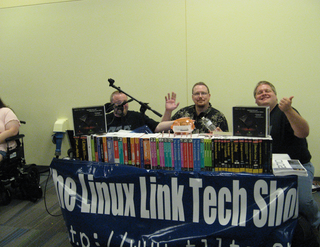
By Klaatu
The Ohio Linux Fest has long been considered a community-centric Linux gathering, and the 2009 incarnation of the festival proved not only that it's an exciting and important event but also that it's not afraid to expand its scope. With more speakers and special events than ever before, OLF managed once again to strike a balance between a fan-based social convention and a corporate-sponsored trade show.
For the community, a beginner's "Intro to Linux" class was taught by the local Free Geek organization. At this gathering, new users installed and used Linux on a computer that, at the end of the session, they got to take home. Also, "early bird" talks were given on the day before the festival officially began, covering diverse topics like Open Street Map, video editing in Blender, Ruby on Rails deployment, and Enterprise Security. On Sunday, a Diversity In Open Source panel convened, with a keynote speech by Rikki Kite, to examine the accessibility of Linux to all groups of potential users and developers.
To those who have only been to traditional trade shows, this professional technical conference might have seemed strange. Whereas most social interactions offered at other conventions are for the purpose of pitching sales, at Ohio Linux Fest, it was not uncommon to find complete strangers gathering in spare rooms or at a nearby bar, excitedly sharing their knowledge with one another. This conference was as much about the people using Linux as it was about the businesses marketing it.
The exhibit hall was full, with booths for the Electronic Freedom Foundation, IBM, Fedora, Sine Nomine, Oracle (with free copies of their Red Hat-based Enterprise Linux discs and a collection of developer tools), the local gaming community Lanville, Zenoss, Linux Pro Magazine, the Linux Fund, and many others. The sponsors took to the "Open Source Solutions" stage to demonstrate their products, adding both a unique opportunity for the vendors to make sales and for the attendees to learn a bit about important real-world Linux applications.
The theme for this year's Ohio Linux Fest was a celebration of "40 Years of Unix," and in that spirit, some non-GNU and non-Linux representatives were at the festival. A "BSD for Linux Users" talk was given by keynote speaker Douglas McIlroy, the programmer behind the Unix pipe. Some broad, OS-independent topics were also covered, such as the use of Drupal, Python for system administrators, and how to get started contributing to open source.
Other talks ranged from beginner level to expert, including an overview of the Linux Boot Process, an examination of 40 years of Unix and 40 years of VM, an introduction to Gnome 3.0, understanding Debian, an introduction to Moblin, developing for non-x86 targets with Qemu, openSim, how to build a community around an open source project, PXE booting, the sys admin's rosetta stone, programming for the young and young-at-heart, and more. As with everything at Ohio Linux Fest, the speaker selection demonstrated that the event organizers were dedicated to having something for everyone.
The real event, though, was generated by the attendees themselves. Regardless of their background, profession, or experience, they learned together, partied together, pondered the state of modern technology, and generated enough energy to keep the festival going for a full three days, even though Ohio Linux Fest is officially only a one-day event. The sheer excitement at the festival resulted in a wedding, with Jon "maddog" Hall himself delivering a blessing for the bride and groom, an impromptu computer give-away from Techie Geek podcast host Russ Wenner, and a book and gadget raffle from the Linux Link Tech Show podcast hosts.
Not just one Linux convert walked away from this year's festival; many people who came to the festival impartial to Linux walked away as fans of the OS and its community. This year was a celebration of more than just the Unix way of doing things; it was a celebration of the people's Unix, a break from restrictive proprietary software, and a demonstration of the eagerness of Linux users to teach and learn and to improve everyone's understanding of computers and technology. Ohio Linux Fest showed the best of the Linux community and the best of Linux technology, as it surely will next year and for years to come.